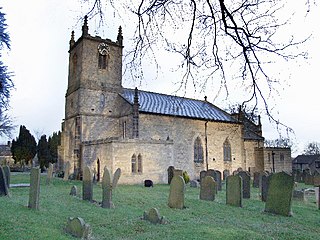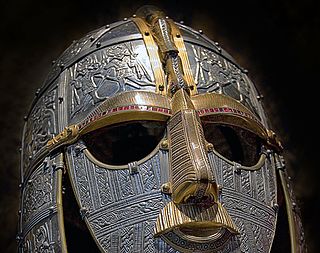
Ceawlin was a King of Wessex. He may have been the son of Cynric of Wessex and the grandson of Cerdic of Wessex, whom the Anglo-Saxon Chronicle represents as the leader of the first group of Saxons to come to the land which later became Wessex. Ceawlin was active during the last years of the Anglo-Saxon expansion, with little of southern England remaining in the control of the native Britons by the time of his death.

The Jutes were one of the Germanic tribes who settled in Great Britain after the departure of the Romans. According to Bede, they were one of the three most powerful Germanic nations, along with the Angles and the Saxons:
Those who came over were of the three most powerful nations of Germany—Saxons, Angles, and Jutes. From the Jutes are descended the people of Kent, and of the Isle of Wight, and those also in the province of the West Saxons who are to this day called Jutes, seated opposite to the Isle of Wight.

The Kingdom of the West Saxons, also known as the Kingdom of Wessex, was an Anglo-Saxon kingdom in the south of Great Britain, from around 519 until Alfred the Great declared himself as King of the Anglo-Saxons in 886.

Mercia was one of the three main Anglic kingdoms founded after Sub-Roman Britain was settled by Anglo-Saxons in an era called the Heptarchy. It was centred on the River Trent and its tributaries, in a region now known as the Midlands of England.

Ecgberht, also spelled Egbert, Ecgbert, Ecgbriht, Ecgbeorht, and Ecbert, was King of Wessex from 802 until his death in 839. His father was King Ealhmund of Kent. In the 780s, Ecgberht was forced into exile to Charlemagne's court in the Frankish Empire by the kings Offa of Mercia and Beorhtric of Wessex, but on Beorhtric's death in 802, Ecgberht returned and took the throne.

The Kingdom of the South Saxons, today referred to as the Kingdom of Sussex, was one of the seven traditional kingdoms of the Heptarchy of Anglo-Saxon England. On the south coast of the island of Great Britain, it was originally a sixth-century Saxon colony and later an independent kingdom. The kingdom remains one of the least known of the Anglo-Saxon polities, with no surviving king-list, several local rulers and less centralisation than other Anglo-Saxon kingdoms. The South Saxons were ruled by the kings of Sussex until the country was annexed by Wessex, probably in 827, in the aftermath of the Battle of Ellendun. In 860 Sussex was ruled by the kings of Wessex, and by 927 all remaining Anglo-Saxon kingdoms were ruled by them as part of the new kingdom of England.

Æthelbald was the King of Mercia, in what is now the English Midlands from 716 until he was killed in 757. Æthelbald was the son of Alweo and thus a grandson of King Eowa. Æthelbald came to the throne after the death of his cousin, King Ceolred, who had driven him into exile. During his long reign, Mercia became the dominant kingdom of the Anglo-Saxons, and recovered the position of pre-eminence it had enjoyed during the strong reigns of Mercian kings Penda and Wulfhere between about 628 and 675.

Cerdic is described in the Anglo-Saxon Chronicle as a leader of the Anglo-Saxon settlement of Britain, being the founder and first king of Wessex, reigning from around 519 to 534 AD. Subsequent kings of Wessex were each claimed by the Chronicle to descend in some manner from Cerdic. His origin, ethnicity, and even his very existence have been extensively disputed. However, though claimed as the founder of Wessex by later West Saxon kings, he would have been known to contemporaries as king of the Gewissae, a folk or tribal group. The first king of the Gewissae to call himself 'King of the West Saxons', was Cædwalla, in a charter of 686.
Dumnonia is the Latinised name for a Brythonic kingdom that existed in Sub-Roman Britain between the late 4th and late 8th centuries CE in the more westerly parts of present-day South West England. It was centred in the area of modern Devon, but also included modern Cornwall and part of Somerset, with its eastern boundary changing over time as the gradual westward expansion of the neighbouring Anglo-Saxon kingdom of Wessex encroached on its territory. The spelling Damnonia is sometimes encountered, but that spelling is also used for the land of the Damnonii, later part of the Kingdom of Strathclyde, in present-day southern Scotland. The form Domnonia also occurs. The name of the kingdom shares a linguistic relationship with the Breton region of Domnonée.
The Wessex Regionalists is a minor English regionalist political party in the United Kingdom. It seeks a degree of legislative and administrative home rule for Wessex, an area in the south and south-west of England loosely based on the Anglo-Saxon kingdom of the same name.

Dore is a large village in the Sheffield district, in the county of South Yorkshire, England. The village lies on a hill above the River Sheaf which gave Sheffield its name and, until 1934, was part of Derbyshire but it is now a suburb of the city.

West Country English is a group of English language varieties and accents used by much of the native population of the West Country, an area found in the southwest of England.
The Gewisse were a tribe or ruling clan of the Anglo-Saxons. Their first location, mentioned in early medieval sources was the upper Thames region, around Dorchester on Thames. However, some scholars suggest that the Gewisse had origins among the ancient Britons at Cair-Caratauc in Wiltshire. According to Saxon folklore, the Gewisse were the founders of the kingdom of Wessex.

The history of Cornwall goes back to the Paleolithic, but in this period Cornwall only had sporadic visits by groups of humans. Continuous occupation started around 10,000 years ago after the end of the last ice age. When recorded history started in the first century BCE, the spoken language was Common Brittonic, and that would develop into Southwestern Brittonic and then the Cornish language. Cornwall was part of the territory of the tribe of the Dumnonii that included modern-day Devon and parts of Somerset. After a period of Roman rule, Cornwall reverted to rule by independent Romano-British leaders and continued to have a close relationship with Brittany and Wales as well as southern Ireland, which neighboured across the Celtic Sea. After the collapse of Dumnonia, the remaining territory of Cornwall came into conflict with neighbouring Wessex.

Old Basing is a village in Hampshire, England, just east of Basingstoke. It was called Basengum in the Anglo-Saxon Chronicle and Basinges in the Domesday Book.

Thomas Hardy's Wessex is the fictional literary landscape created by the English author Thomas Hardy as the setting for his major novels, located in the south and southwest of England. Hardy named the area "Wessex" after the medieval Anglo-Saxon kingdom that existed in this part of that country prior to the unification of England by Æthelstan. Although the places that appear in his novels actually exist, in many cases he gave the place a fictional name. For example, Hardy's home town of Dorchester is called Casterbridge in his books, notably in The Mayor of Casterbridge. In an 1895 preface to the 1874 novel Far from the Madding Crowd he described Wessex as "a merely realistic dream country".

The Kingdom of the East Angles, informally known as the Kingdom of East Anglia, was a small independent kingdom of the Angles during the Anglo-Saxon period comprising what are now the English counties of Norfolk and Suffolk and perhaps the eastern part of the Fens, the area still known as East Anglia.

The English people are an ethnic group and nation native to England, who speak the English language, a West Germanic language, and share a common ancestry, history, and culture. The English identity began with the Anglo-Saxons, when they were known as the Angelcynn, meaning race or tribe of the Angles. Their ethnonym is derived from the Angles, one of the Germanic peoples who invaded Britain around the 5th century AD.

The settlement of Great Britain by diverse Germanic peoples led to the development of a new Anglo-Saxon cultural identity and shared Germanic language, Old English, which was most closely related to Old Frisian on the other side of the North Sea. The first Germanic speakers to settle permanently are likely to have been soldiers recruited by the Roman administration, possibly already in the fourth century or earlier. In the early fifth century, after the end of Roman rule in Britain and the breakdown of the Roman economy, larger numbers arrived and their impact upon local culture and politics increased.















